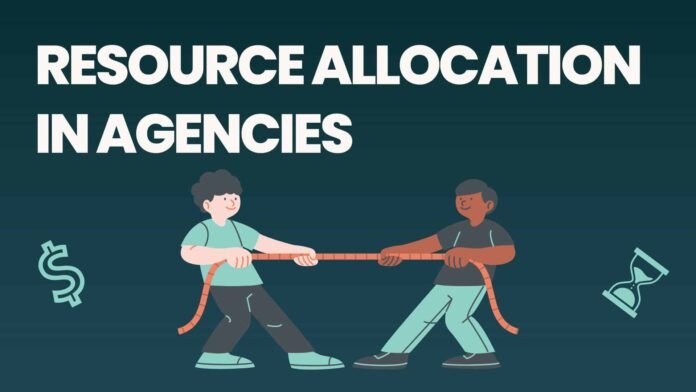Last Updated on May 14, 2025 by Rida Gul
In business, understanding resource management can be the pillar standing between failure and success. As an entrepreneur, having a nuanced perspective on the topic can help you better allocate your resources, increase efficiency, and heighten profitability. In addition, effective resource management is crucial in ensuring timely delivery of projects and long-term sustainability. Keep reading and become well-versed in all you need to know about resource management.
Table of Contents
Understanding the Fundamentals of Resource Management
Alt Text: A team meets about resource management utilization.
Resource management centers on efficiently and effectively deploying an organization’s resources when they are needed. These resources could range from tangible ones like machinery and software, to intangible ones like time and knowledge. Understanding the basics of resource management ensures a firm foundation, upon which an organization can maximize profitability.
In essence, the concept is fundamentally about getting the right resources on the right tasks, at the right time. It’s about ensuring that the available resources are utilized optimally and not wasted. Poorly managed resources can lead to financial losses, missed deadlines, and poor product quality.
Moreover, mastering the principles of resource management can contribute significantly to achieving business objectives. It’s all about balancing the available resources with the company’s operational needs.
The Core Principles of Successful Resource Management
The fundamental principles of resource management are consistent across industries. Knowing these principles is integral to any successful resource-managing strategy. Significantly, these principles center on maximizing the value of resources and avoiding wastage.
For instance, one of the key principles would be strategic planning. This involves aligning the organization’s resources with its strategic objectives. Another principle is value optimization, where the aim is to get the most out of available resources, without compromising on quality or efficiency.
To apply these principles effectively, companies often turn to various resource management techniques. For example, they use resource leveling and resource allocation strategies for efficient resource utilization.
How Effective Resource Management Contributes To Business Success
Alt Text: Two resource managers work on a whiteboard.
Resource management is a crucial component in driving business success. When resources are managed effectively, they can bring about increased operational efficiency and productivity. Importantly, it helps in reducing costs by preventing resource wastage.
Furthermore, effective resource management leads to better forecasting. Accurate forecasting prevents over-allocation or under-allocation of resources, which can lead to wastage and inefficiency. Moreover, it ensures that the right resources are available at the right time, thereby contributing to better project execution and overall success.
On the human resources front, adept management of people resources can lead to improved employee satisfaction and retention. An organization that optimally manages its resources can maintain a well-balanced and motivated workforce, thereby reducing turnover rates.
Implementing Resource Management Techniques in Your Organization
Having acknowledged the benefits of efficient resource management, the next step is implementation. However, the actual implementation of resource management techniques depends heavily on the specific needs of an organization.
The first step in implementing resource management would be to establish a competent resource management team. This team would be responsible for managing, allocating, and monitoring the organization’s resources.
Next comes the setting up of resource management procedures – a defined process for managing resources. Procedures may include specifics regarding resource allocation, procurement procedures, resource review processes, and disaster recovery procedures, among others.
Altogether, effective resource management serves as the backbone of any thriving business. It provides a multifaceted approach that aligns with an organization’s strategic objectives and maximizes efficiency. Now that you’re familiar with the essentials, it’s time to start plotting a resource management plan that suits your business’s unique needs.



























